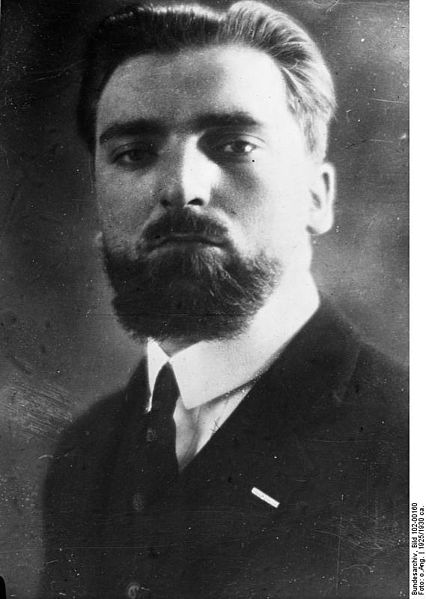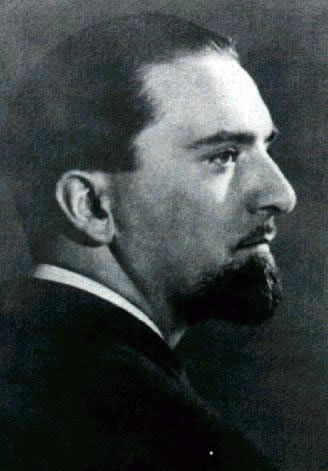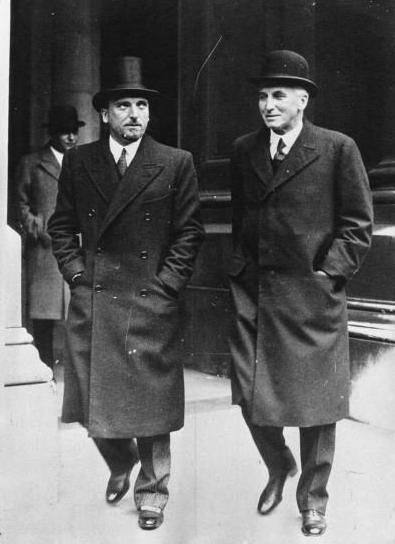<Back to Index>
- Minister of Foreign Affairs Dino Grandi, 1895
PAGE SPONSOR



Dino Grandi (June 4, 1895 – May 21, 1988), Conte (Count) di Mordano, was an Italian Fascist politician, minister of justice, minister of foreign affairs and president of parliament.
Born at Mordano, province of Bologna, Grandi was a graduate in law and economics at the University of Bologna in 1919 (after serving in World War I). Grandi started a career as a lawyer in Imola. Attracted to the political left, he nonetheless became impressed with Benito Mussolini after the two met in 1914, and became a staunch advocate of Italy's entry into the World War.
He joined the Blackshirts at age 25, and was one of 35 Fascist delegates elected, along with Mussolini, in May 1921 to the Chamber of Deputies. Grandi survived an ambush carried out by leftist militants in 1920, and had his studio devastated on one occasion.
After the March on Rome on October 28, 1922, in which the Fascists took power in Italy, Grandi became part of the new government; first as the under secretary of interior (1923), then as the Italian Minister of Foreign Affairs (1929), and also served as Italy's ambassador to the United Kingdom (1932 to 1939). He was recalled to Italy in order to be appointed as the Minister of Justice. Dino Grandi was an ally to the most radical and violent groups of fascists, always surrounding himself with members of the Blackshirts. He used his position to voice criticism of Mussolini's attempt to reach an armistice with left wingers, and was under suspicion for having attempted to replace the latter with the skeptical alleged Mussolini forerunner Gabriele D'Annunzio.
As a diplomat, Grandi created a net of connections that were only rivaled by Mussolini's son - in - law, Galeazzo Ciano, and attempted to use it for his own gains. Thus, he persuaded King Victor Emmanuel III to grant him a title, and managed to afford a comfortable position until being sent by Mussolini to the Greek Front in 1941.
As World War II (which Grandi opposed) began to have its devastating effect on Italy after Operation Husky, Grandi and other members of the Fascist Grand Council met on July 24, 1943. At this meeting, Grandi turned against Mussolini and made a motion asking King Victor Emmanuel III to resume his full constitutional authority. The resolution passed by a vote of 19 to 7, with one abstention — effectively removing Mussolini from office. Those leading government figures who had voted for the resolution included Giuseppe Bottai and Emilio De Bono as well as Grandi. The King arrested Mussolini the next day.
Grandi also negotiated a truce with the left wing movements, notably with the trade unions (grouped in the Confederazione Generale Italiana del Lavoro), which gave way to the Italian resistance movement against Nazi Germany.
While the Allies occupied the south, an alternate Fascist government was established in Northern Italy as the Italian Social Republic. It sentenced Grandi to death for treason in the Verona trial that took place in on January 8 – 10, 1944. Grandi, however, had the foresight to flee to Francisco Franco's Spain in August 1943. He lived there, then in Portugal (1943 – 1948), then Argentina, and then São Paulo, Brazil, until the 1960s; he died in Bologna. Coincidentally, Grandi died on the same weekend as two post war Italian Fascist leaders. Like Grandi, Pino Romualdi died on May 21, 1988, while Giorgio Almirante died the following day.